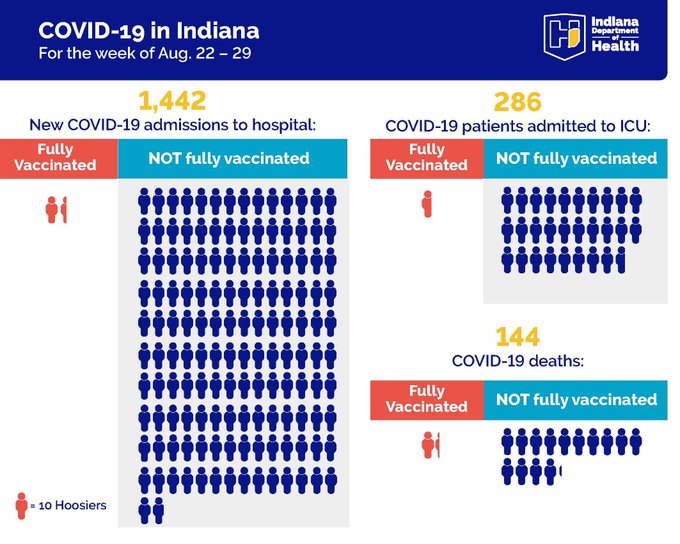Wayne County has lost its first 40-something resident to COVID-related illness.
In addition, nearly 70 kids and teens tested positive for the virus during the Labor Day weekend, which is about the same number of patients in containment areas at a local hospital on Tuesday, Sept. 7.
Over those four days, Wayne County recorded 227 new COVID cases, with 68 of them being in those 18 and younger.
It recorded COVID-related deaths for a patient in their mid-40s, a 60-year-old, and someone in their early 70s. Two men and one woman died.
Wayne County Health Department officials said all three victims were unvaccinated.
Wayne County is set to exceed 9,000 lab-confirmed positive cases of COVID when Wednesday’s numbers are announced. The county’s 80 new cases announced Tuesday by Indiana Department of Health brought its pandemic total to 8,996.
“High numbers of cases have consequences,” said Christine Stinson, WCHD executive director, in a news release. “It is a burden on our healthcare system, it is a strain on our schools, and it is a death sentence to some in our community.”
Breakthrough cases rising
Stinson said Wayne County had 612 lab-confirmed positive cases in the last days of August and first days of September.
Nearly 5 percent (4.7) of those infections were recorded in those who already have been vaccinated, called breakthrough infections.
Dr. David Jetmore, Wayne County health officer, said those statistics serve as a reminder that “vaccinations do not make you invincible.”
“Breakthrough infections remind us that vaccinations are there to reduce the likelihood we will become infected and also lessen the severity of the infection should we happen to become infected,” said Wayne County Health Officer Dr. David Jetmore.
In a Tuesday news release, Reid Health staff say they are pleading with local residents to get vaccinated as soon as possible, even if they aren’t among those most at risk from severe illness, calling it a social responsibility not to spread the virus to those who are more vulnerable.
“Vaccinations are our only way out of the pandemic,” Reid staff said.
As the highly contagious Delta variant surges, county and Reid officials continue to urge vaccinations and other prudent strategies such as wearing masks in public, avoiding crowded indoor spaces, frequent handwashing and staying away from those who are sick.
Indiana Department of Health is sending a team back to Richmond’s Ivy Tech campus to offer tests and vaccinations from noon to 8 p.m. Friday, Sept. 10, and Saturday, Sept. 11, at the north lot at 2357 Chester Blvd. No appointment is necessary.
The team will offer PCR tests with higher accuracy as well as the rapid antigen tests for quicker results when symptoms are present.
Also, Hoosiers can choose either the two-dose Pfizer vaccine or the one-dose Johnson & Johnson shot. Those ages 12 to 17 can get the Pfizer vaccine.
Hospital feeling the strain
Reid officials say the health system is feeling the strain of a new surge of COVID patients.
On Tuesday, 67 patients were in the Richmond hospital’s containment areas, with 62 of them being confirmed as COVID-positive. Reid said 57 of those patients were not vaccinated.
The hospital had had 27 suspected COVID-19 admissions in the past 24 hours.
Reid’s current COVID numbers are in line with its record weekly average of 61 in the final week of November 2020 and into the first week of December.
Reid’s number of patients in its containment areas topped 100 in early December, but many of those turned out to not be positive. At that time, test results were processed by outside labs, and more patients stayed in containment areas while awaiting an official diagnosis. However, Reid now conducts COVID testing in-house, so turnaround times for test results are shorter.
Hospital staff said that case volumes are overwhelming staffing resources and beginning to affect other healthcare services because bed status has been at a critical level over the past few weeks.
“Nevertheless, you should not delay care,” a press release noted, emphasizing the word “not.” “Previous surges have seen patients put off necessary care for emergent issues such as chest pain, stroke symptoms, appendicitis, and even symptoms of cancer. Delaying care can have life-altering consequences.”

